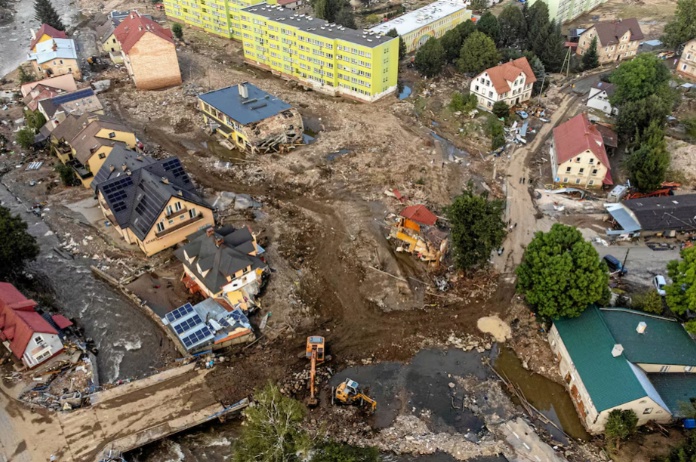Leaders of the four countries affected by Storm Boris will meet European Commission President Ursula von der Leyen in Poland on Thursday to discuss aid for the flood-hit region.
The death toll from the storm that hit central and eastern Europe in recent days rose to 24 on Wednesday, with some areas still threatened by rising waters.
Parts of the Alps in Bavaria are expected to receive 60 to 100 mm of rain, while the German Meteorological Service (DWD) has forecast the first heavy snowfalls of the year, with regions above 1,500 metres expected to receive up to 50 centimetres of snow.
The meeting between Polish Prime Minister Donald Tusk, his Czech counterpart Petr Fiala, Slovak Robert Fico and Austrian Chancellor Karl Nehammer will take place in Wroclaw, a historic city of 670,000 people in southwestern Poland.
Residents of Wroclaw, which suffered devastating floods in 1997, are increasingly worried about rising waters. The flooding is expected to peak on Thursday. Although it will be lower than in 1997, dams could be threatened if the floodwaters continue for several days.
Hungarian Prime Minister Viktor Orbán, who cancelled all his international events this week because of the storm, will not attend the meeting, although his country has also been hit hard. Romania’s prime minister will also be absent due to a defence meeting.
In the Czech Republic, areas in the north-east of the country have been particularly hard hit, with streets in the towns of Jeseník and Opava going under water over the weekend. Thousands of Opava residents were displaced by the overflowing river of the same name, while in Jeseník hundreds of people were rescued from the flood zone by boats and helicopters.
Czech Prime Minister Petr Fiala labelled the disaster the “flood of the century”, warning that the peak was still to come.
Better coordination
Commission deputy spokeswoman Arianna Podesta told reporters that von der Leyen would “will visit the area at risk in Wroclaw to assess the situation created by the recent heavy floods and rains that have hit Poland”. She also added:
She will discuss the actions taken by the authorities to respond to this crisis.
Austrian representative Nehammer said:
We must use and expand the instruments that have been created for disasters like this. I will call in Poland for the activation of the EU Civil Protection Mechanism.
The Austrian capital Vienna, surrounded on all sides by the federal state of Lower Austria, experienced widespread disruptions to public transport till September 16. Many metro lines are only partially operational, and some trains have also been cancelled.
According to Nehammer, the summit will also discuss “even better coordination of flood defence measures.”
In Poland, the floods have affected several settlements in the south-west of the country, including the town of Glucholazy, where a bridge was swept away by the floods. Now the flood threat has been declared in Wroclaw. Authorities in the city, which stands on the Oder River, have increased safety measures, including the introduction of round-the-clock monitoring of dams and canals. The tidal wave reached Wroclaw on Wednesday, 18 September. However, authorities anticipate that the current flooding will not be as severe as in 1997, when a third of the city was inundated.
The Polish government said it had unblocked 470 million euros (two billion zlotys) in direct aid to people and communities affected by the flooding. Austria said its disaster relief fund would be increased to one billion euros to help flood victims.
Nicola Fratoianni, Italian politician and leader of the Italian Left party, reposted a post on X criticising EU authorities over the disaster:
The current floods all over Europe are a climate crime caused by fossil corporations! We have to make them pay for their crimes, past and present, in Europe and the Global South!
